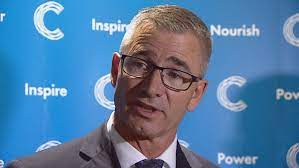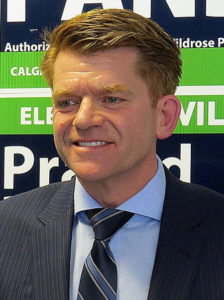In this analysis I compare both the slogans and key phrases of the candidates. Slogans and phrases which are meant to attract members to vote for their preferred candidate and some of the detail of their top policy priorities.
I also drill down to examine three policy areas in more detail.
At the time of publication Danielle Smith is the presumed frontrunner with Travis Toews second and Brian Jean third.
High level slogans compared
According to Danielle Smith’s “Alberta First” campaign she will:
- Free Alberta from Ottawa’s control;
- Protect the rights and freedoms of Albertans;
- Unleash our economic potential and restore the Alberta Advantage, and
- Defeat Rachel Notley and the NDP in the next election

Travis Toews promises responsible, stable leadership and promises to unite the fractious party stating “we are better together, stronger in our diversity and in our unity.” Toews touts his experience in the private sector and his track record of tax cuts and a balanced budget. He claims he will put “Alberta upon a sustainable fiscal trajectory.” The latter pledge I certainly would vote for.

For Brian Jean , like Smith and Toews, all wishing to pick up disgruntled rural dwellers angry at Justin Trudeau and the federal government, pushing for “autonomy” for Alberta is his sovereignty brand. His goal is to make Albertans the “happiest, the healthiest, the most free and most prosperous people in Canada and the world.” Who could argue with that? He goes on to make both specific and general promises.

These include:
Saving at least $0.25 on gasoline and diesel;
Reduce electricity distribution and transmission fees;
Fight for more autonomy for Alberta within Canada; and
Fight for personal autonomy and community.
Alberta Sovereignty
On the matter of Alberta independence Smith is direct- she wants independence. Her website hosts a lengthy section addressing fears thrown up by her opponents. According to Smith’s website post she says:
Obviously, none of these so-called ‘experts’, media members or politicos have read the bill (as drafting legislation is not typically done during political campaigns as most understand), and are simply assuming the legislation will be unconstitutional in order to justify their knee-jerk opposition to the concept.
My hope in releasing this Overview of the proposed Alberta Sovereignty Act, is that even more Albertans, their MLAs and perhaps even some critical thinkers in the mainstream media, will take a thoughtful look at this policy proposal, and join the growing number of Albertans who want to see our Province stand up to Ottawa, restore our constitutional rights, and take control of our future.
The objective of the Alberta Sovereignty Act is to assert Alberta’s Constitutional Rights within Canada to the furthest extent possible by effectively governing itself as a Nation within a Nation, just as Quebec has done for decades and as Saskatchewan is also now proposing. (Emphasis added).
If this sounds like ‘States rights’ it certainly throws down the gauntlet to the despised Canadian judiciary who have thwarted Alberta’s efforts to fully receive natural resource rights under section 92A of the Constitution Act and the associated schedule.
The entire section and Sixth Schedule is shown below.
|
Non-Renewable Natural Resources, Forestry Resources and Electrical Energy Laws respecting non-renewable natural resources, forestry resources and electrical energy 92A (1) In each province, the legislature may exclusively make laws in relation to (a) exploration for non-renewable natural resources in the province; (b) development, conservation and management of non-renewable natural resources and forestry resources in the province, including laws in relation to the rate of primary production therefrom; and (c) development, conservation and management of sites and facilities in the province for the generation and production of electrical energy. Export from provinces of resources (2) In each province, the legislature may make laws in relation to the export from the province to another part of Canada of the primary production from non-renewable natural resources and forestry resources in the province and the production from facilities in the province for the generation of electrical energy, but such laws may not authorize or provide for discrimination in prices or in supplies exported to another part of Canada. Authority of Parliament (3) Nothing in subsection (2) derogates from the authority of Parliament to enact laws in relation to the matters referred to in that subsection and, where such a law of Parliament and a law of a province conflict, the law of Parliament prevails to the extent of the conflict. Taxation of resources (4) In each province, the legislature may make laws in relation to the raising of money by any mode or system of taxation in respect of (a) non-renewable natural resources and forestry resources in the province and the primary production therefrom, and (b) sites and facilities in the province for the generation of electrical energy and the production therefrom, whether or not such production is exported in whole or in part from the province, but such laws may not authorize or provide for taxation that differentiates between production exported to another part of Canada and production not exported from the province. Primary production (5) The expression primary production has the meaning assigned by the Sixth Schedule. Existing powers or rights (6) Nothing in subsections (1) to (5) derogates from any powers or rights that a legislature or government of a province had immediately before the coming into force of this section. THE SIXTH SCHEDULEE Primary Production from Non-Renewable Natural Resources and Forestry Resources 1 For the purposes of section 92A of this Act, (a) production from a non-renewable natural resource is primary production therefrom if (i) it is in the form in which it exists upon its recovery or severance from its natural state, or (ii) it is a product resulting from processing or refining the resource, and is not a manufactured product or a product resulting from refining crude oil, refining upgraded heavy crude oil, refining gases or liquids derived from coal or refining a synthetic equivalent of crude oil; and (b) production from a forestry resource is primary production therefrom if it consists of sawlogs, poles, lumber, wood chips, sawdust or any other primary wood product, or wood pulp, and is not a product manufactured from wood. (Emphasis added) |
On the constitutionality of her Act, Smith’s approach plans to tie up the judicial system while the jurisprudence is settled. Abpolecon.ca has speculated that this power might be initially used when a potential tailings’ ponds spill facing federal refusal to release tailings to reduce pressure on the berm. Of course, it is questionable whether oilsands companies would defy federal jurisdiction on navigable waters.
Where disagreements surrounding constitutionality may arise between the Federal and Alberta Governments, are the specific actions the Alberta Government and Legislature choose to utilize via the Special Motion process outlined above. These may then have to be litigated accordingly. However, during that litigation process, the non-enforcement actions undertaken by the Province via Special Motion will continue to remain in force unless otherwise stayed by court order. (Emphasis added)
Smith will not declare herself a separatist for obvious reasons.
Her competitors take a slightly different tack on what it will take to quiet the separatists. Sovereignty is a concept quite familiar in Quebec where sovereignty was for sale *Robert Bourassa’s “federalism rentable”) from the 1960s to the 1990s,
Alberta could be heading for a referendum on sovereignty under a Smith government- although the chances are very low –at this time.
On the supposedly economic chaos this idea would create as with previous Quebec referenda, she says that the Trudeau government has effectively shut down any economic development in the province. Her campaign website notes “Ottawa’s unlawful policies and an utter lack of provincial leadership on effectively pushing back against those attacks,” rendering the chaos argument “naïve.”
Brian Jean offers separatism lite- a type of sovereignty-association- “autonomy for Alberta within Canada,” promising to force Ottawa and other provinces to the constitutional bargaining table. This promise seems fanciful. Alberta would have to get onside at least half the provinces to practically support opening another constitutional round. Alberta would have the like-minded Scott Moe on the team. Could Premier Jean attract other western leaders and the Newfoundland and Labrador premier? Might be possible but unlikely.
Jean’s “Autonomy Act,” which hasn’t received as much attention as Smith’s sovereignty act, begins with the declaration that upon his assumption of power Alberta will “serve legal notice on the federal government and the other provinces that Alberta is invoking Section 46 (Initiation of amendment procedures) of the Constitution Act (1982) and demanding formal negotiations on amending the constitution.” While this may be technically possible, it is unclear to this writer that one province can practically move forward with amendments without the support of the legislative assemblies of at least two-thirds of the provinces.
Toews meanwhile counters all this with “stable” and “responsible” leadership. This is a shot primarily at Smith and some of her strategic errors, notably the “naturopath solution” and the Alberta Sovereignty Act.

Toews proposes a “strategic” approach to the federal government. He prefaces his strategy by reminding his voters that Alberta has transferred $600-billion to the rest of Canada. He also has a well choreographed critique of the “previous Prime Minister Trudeau’s” notorious national energy program. This then sets the context of Toews growing up as a teenager with scratchy pictures of empty downtowns and unemployed workers and lost homes. What proud Albertan would not be outraged.
His main strategy is to attack “radical and risky policies” implemented in the province while referring to “calls from New York” wondering if the province was going to separate. These calls are from financiers telling the province would be scaring away needed investment. Toews also wants a separate Alberta pension plan and Alberta police force, both to be negotiated with Albertans, not imposed. He wishes to erode federal revenue capacity take control of raising revenues because Albertans know how best to spend “their own money.” and not send it back with strings attached. He proposes a foolhardy set of tariffs, likely unconstitutional, that would be implemented if Ottawa climate policies treated industries equitably (energy, agriculture) he would through legislation “tangibly push back” against other provinces with tariffs targeted to specific goods and services
Toews is against independence mainly for business confidence reasons. He is a strong provincialist but not a sovereigntist/separatist.
Shandro casts his support behind SmithIn an extraordinary break with his boss Jason Kenney, Justice Minister Tyler Shandro, the former accident-prone health minister, announced on 26 September he would challenge what he calls the “federal firearms confiscation program.” Responding to a federal ministerial request, Shandro
Shandro is therefore the first minister to utilize one of the principles of Danielle Smith’s platform where the provincial government deems a federal action an intrusion into provincial jurisdiction and disagrees with the policy, the province will stop federal enforcement. The Free Alberta Strategy lobby group headed by Smith’s campaign chair Rob Anderson quickly congratulated the justice minister. To his contacts Anderson emailed: In fact, that’s exactly what we recommended when we released our proposal for the Alberta Sovereignty Act. But, haven’t many of the incumbent Alberta government MLAs – including the now-interim Premier – spent the last 6 months telling us all that this is impossible, and to try to do so would cause chaos? And now, the Justice Minister, on behalf of the cabinet and the government, is proposing to do exactly that? · Yeah. · Probably slightly awkward for them… · Still, we’re very glad they’ve come around! · And, just as we predicted, the sky didn’t fall in. · The rule of law wasn’t undermined. · Big corporations didn’t complain about instability and threaten to leave Alberta – in fact, as we noted last week, they continue to announce they will be moving here. · Minister Shandro did exactly as we proposed. It may be a tad early to break out the champagne. However Shandro’s defiance of Kenney’s well-known opposition to the sovereignty act strategy should guarantee Shandro a senior place at the Danielle Smith cabinet table. Shandro earlier endorsed Toews, |
Platform Priorities
Danielle Smith’s top three policies are
- Health Spending accounts;
- The Alberta Sovereignty Act; and
- Censorship
Danielle Smith Source: The Catholic Register
Competitor Toews has identified five key policies
- Making life affordable;
- Strengthening Alberta;
- Stronger Healthcare for Albertans;
- Support Alberta farmers; and
- Excellence in education.
Lastly Brian Jean promises:
- Autonomy for Albertans Act;
- Personal autonomy; and
- Health policy.
Jean’s Unique Policies
Brian Jean is interested in the mechanics of legislative drafting. He believes his legislative draftsmanship will ensure autonomy for Alberta specifically protecting Albertans from state actions penalizing opposition to mandatory health measures producing a laundry list of rights.
Other policy details are also intriguing. Alberta would name:
–Canada’s representative to the International Energy Agency.
-Canada’s representative to OPEC+ meetings.
-a permanent delegate position on Canada’s delegations to COP climate meetings and the IPCC, and
= an official seat on Canada’s official delegation at any G7 / G20 / International Monetary Fund / or World Bank meeting where energy policy is being discussed.
Other highly specific policies on offer include:
=stop unfairly expropriating the assets of Alberta energy companies in Quebec. In consequence of that Alberta will prohibit SNC-Lavalin from being part of any project that has received Alberta government funding.
-prohibit SNC-Lavalin from being part of any project that has received Alberta government funding.
-prohibit organizations under provincial government control such as AHS and the Alberta Energy Regulator from being World Economic Forums members or affiliates or attending their events or projects.
-prohibit municipalities from becoming WEF members or using taxpayer dollars to participate in WEF events or projects.
-Start a constitutional challenge on the West Coast Tanker Ban (C-48) law.
–File a Supreme Court reference on Trudeau’s proposed de-facto production caps. The language from the Supreme Court’s carbon tax decision does not guarantee that the federal government can directly or indirectly impose caps on provincially regulated industries.
-challenge “Trudeau’s proposed nitrogen/fertilizer emission caps.
This lengthy series reveals a lawyer looking to prohibit subordinates from doing things he doesn’t like while mounting legal challenges to unfair federal laws all the while remaining in Canada. It is Smith-lite but his intention, like Kenney’s, is stirring up hostility towards outside enemies of the Alberta state.
Health Care
Health figures prominently in all three campaigns. In a policy video-twitter link Smith pledged a $300 investment in individual health spending accounts, or $1200 per family of four. This can be used for dentists, physiotherapists, chiropractor and other health occupations, including naturopathy. This would be a significant boost to the finances of these professions with a price tag (unmentioned) of approximately $1.35-billion for taxpayers. More questionable however is her declaration she would fire the board of Alberta Health Services and unbelievably the board of the College of Physicians and Surgeons of Alberta.
While the account is criticized by health advocates for a variety of reasons, Toews is planning to go even further with AHS to “decentralize” Alberta Health Services and “keep executives accountable.” Decentralization was rampant before efforts of the Klein government to bring some uniformity to the system. Alberta’s consolidation in the early 2010s created considerable chaos but generally served Albertans well during the COVID-19 pandemic.
One of the key achievements of the NDP government was to maintain stability in the system still reeling from the organizational chaos of the centralization process.

Toews attacks the AHS bureaucracy and wants decentralization reflecting the challenges of rural citizens to access tertiary care regionally. Toews proposes to address this with an annual $50-million rural health facility fund. Other measures include facilitating foreign credentialling, improved incentives for rural general practitioners, and “better use of paramedics and ambulances.” He also supports “diverse delivery options” – code for more private care.
Brian Jean’s health policy initiatives call for:
increasing the role of nurse practitioners,
working with the United Nurses of Alberta to expedite entry of more foreign nurses,
retention bonuses for our experienced nurses,
signing bonuses for nurses who return to the profession under an alternative collective agreement framework that is designed to reward nurses on a salary basis and prevent nursing overtime burnout,
reinstate all nurses who left nursing in Alberta from 2021 forwards due to vaccine mandates, and
a long-term plan that leads to having two medical school graduating classes a year in Edmonton and Calgary.
Jean is also planning to work with doctors to expedite hiring of foreign doctors and decentralizing some of the training away from Edmonton and Calgary. While Jean does not propose turning the system upside down, he wants to give more “autonomy” to regional medical officers and ‘improve the unitarization (sic) of health assets, specialized equipment, and health infrastructure around Alberta.
The most radical aspect of health care reform is in Jean’s desire to give physicians the power to refuse treatment and “immunity from acting on a patient’s safe and ethical requests.” Further, an informed patient will be able to refuse treatment, request safe treatment even if off-label, can even, under law, request medical assistance in dying. “A health professional has, and should have, conscience rights to refuse to help a patient in any of these circumstances. But, likewise, a health professional should not be punished for respecting the informed personal medical autonomy of an individual patient and acting on their safe and ethical requests” (Emphasis added).
The question of access to abortion comes to mind.
Freedom & Censorship
Now to the thorny question of what “freedom” and censorship mean for the various candidates. Jean and Smith are basically on the same page. They are for preventing governments from ordering vaccinations in cases of pandemics or enforcing evacuations during wildfires, for individual and public safety reasons. Freedom is the highest good for these individualist-minded politicians. These words place individual preference ahead of collective well-being and safety.
The overall priority preference of Smith and Jean mirrors the freedom rhetoric of Pierre Poilievre and the freedom convoy. For Smith this disposition is rooted in her libertarianism instincts and for Jean his distrust of government officials making choices for the public.
Toews emphasizes his experience as a business man and finance minister. He continues to hammer away at the importance of the business sector to community well-being. This means business freedom from unnecessary and intrusive government regulations, free movement of capital and the private sector’s sole monopoly on creating wealth.
A subsequent blog post will examine character of the three leading candidates.
Related Posts
